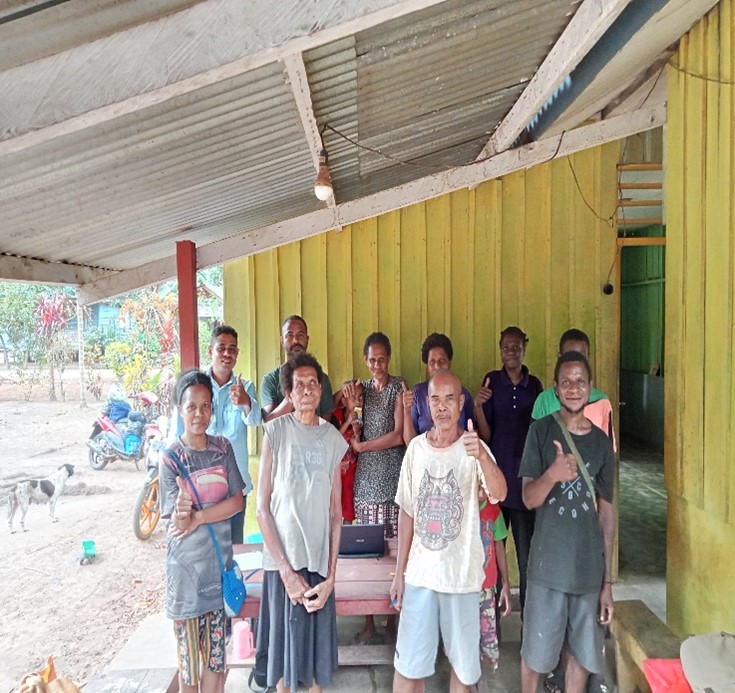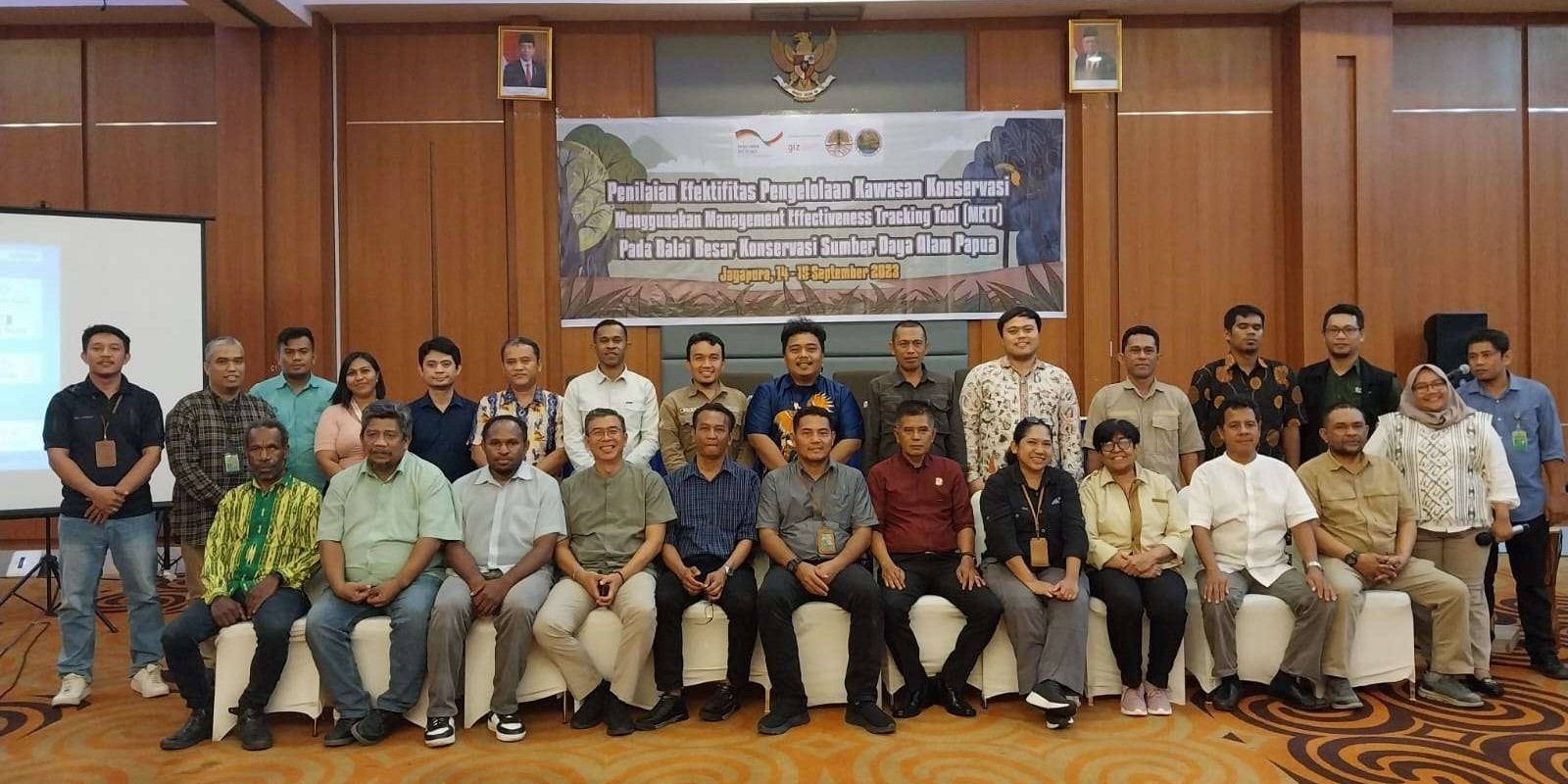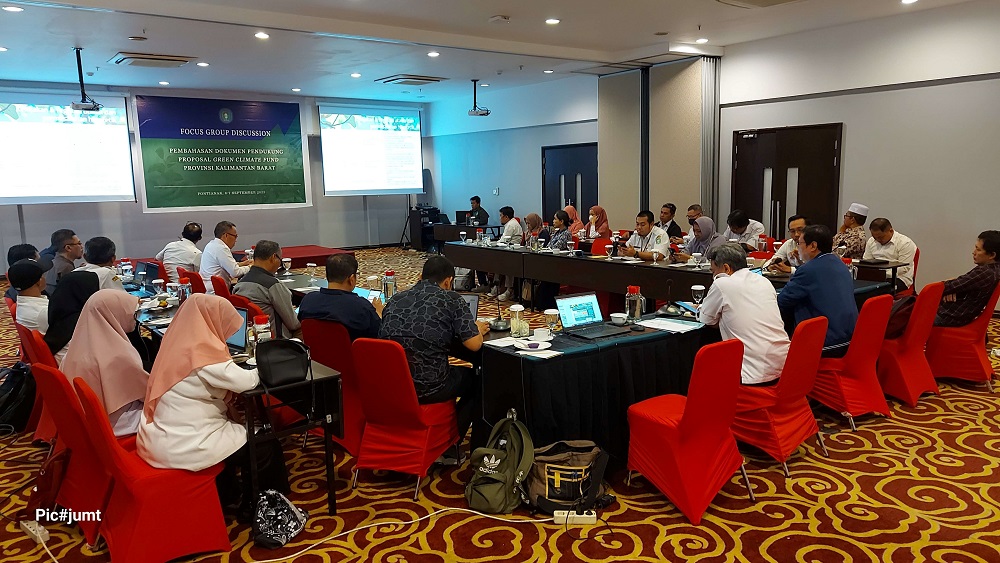FORCLIME
Forests and Climate Change ProgrammeTechnical Cooperation (TC Module)

Select your language

Referring to the regulation of the Head of the Human Resources Extension and Development Agency (BP2SDM) of the Ministry of Environment and Forestry P.5/P2SDM/SET/KUM.1/7/2020, basic budget and bylaws (AD/ART) documents are one of the important requirements for institutional assessments of forest farmers’ groups. AD/ART comprise sets of rules that must be drawn up as guidelines for use during the management of an organization. These documents should set out a clear path that can be navigated by forest farmers’ group organizations, while the existence of said documents confirm that a given forest farmers’ group is a complete organization.
Therefore, after identifying the Maroti farmers’ group in Yanggandur Village, one of the villages that is currently being supported by the Wasur National Park and FORCLIME in Merauke Regency, South Papua, Theodorus Tethool S.Sos., a village facilitator, assisted in the process of preparing an AD/ART for the Maroti farmers’ group on 12 – 13 September 2023 in Yanggandur Village.
It is hoped that through this mentoring and guidance process, the community's economy will be stimulated and empowered through the utilization of non-timber forest products. KTH Moruti is a new farmers’ group that has not yet been categorized as Beginner Class. The AD/ART that is currently being drafted will ultimately become a guide for use by the group and, in addition, should become a catalyst for improving the category class of KTH Moruti.
For further information, please contact:
Theodorus Tethool, Yanggandur Village Facilitator
Ruben Yogi, GIS and Mapping Advisor
Rut Ohoiwutun, Community Forest and Customary Forest Advisor

During the management of conservation areas, assessments of management effectiveness represent an important instrument when identifying priorities and resource allocation as a part of attempts to achieve sustainable management goals. The management of conservation areas within Papua Province is the responsibility of the Natural Resources Conservation Center (BBKSDA) in Papua Province, which is the technical implementing unit of the Directorate-General of Natural Resources and Ecosystem Conservation at the Ministry of Environment and Forestry. BBKSDA Papua manages 19 conservation areas of a total area of approximately 4,132,502.71 hectares spread across 24 districts/cities and four provinces, specifically Papua, Central Papua, Central Mountain Papua and South Papua.
In order to assess the effectiveness of conservation area management within its territory, BBKSDA Papua organized an assessment of 10 conservation areas under its administration from 14 - 15 September 2023 in Jayapura, Papua. This follows assessments of nine other conservation areas that were carried out at the end of last year.
The assessment activity for the 10 conservation areas was opened by the Head of the Papua BBKSDA, A.G. Martana, S.Hut., MH., and was attended by 60 participants who were representing related parties. During the assessment, the Director of Conservation Area Management, Jefri Susyafrianto, delivered his speech and directions online.
To assess the effectiveness of conservation area management, the Directorate-General of Natural Resources and Ecosystem Conservation has created the Management Effectiveness Tracking Tool (METT), which is an internationally accepted approach to the monitoring and assessment of the overall management of conservation areas. The METT can help conservation area managers assess how effectively their conservation areas are being managed and what efforts are required in order to maintain and/or improve existing conditions. The assessment will ultimately result in recommendations and action plans that will hopefully increase the overall effectiveness of conservation area management.
For more information, please contact:
Ruben Yogi, Junior Adviser for GIS and Forest Mapping
Mohammad Sidiq, Strategic Area Manager for Sustainable Forest Management and Coordinator for Tanah Papua

Continuing the process of preparing proposals and feasibility studies for climate funding projects for the Green Climate Fund (GCF), the West Kalimantan Provincial Government organized an FGD to discuss supporting documents for the GCF Proposal on 6 – 7 September 2023 in Pontianak, West Kalimantan. The supporting documents discussed at the meeting comprised: Policy and Institutional Framework for Forest and Land Management; Climate Risk and Vulnerability Assessment (CRVA); Gender Assessment and Action Plan (GA-GAP). In addition, this meeting also aimed to connect and build communication among provincial parties, as well as solicit input on the various documents that are currently being prepared. The hybrid meeting was attended by resource personnel responsible for the drafting of the supporting documents, in addition to various division heads from the Provincial Environment and Forestry Service, who delivered presentations and discussions directly, with the exception of gender-related discussions, which were conducted online.
The preparation of the supporting documents is being conducted in line with an overall project design that aims to: 1) Strengthen the policy and institutional framework through informed planning in terms of climate-related issues; 2) Improve and expand learning regarding climate-resilient agricultural and agroforestry practices; 3) Improve community-based forest and land management.
The FGD was opened by the Secretary of the West Kalimantan Environment and Forestry Service, Mr. Amung Hidayat, SP, M.Sc., and was attended by the REDD+ Working Group, as well as the team responsible for the compiling of the supporting documents, specifically Prof. Dr. Bramasto Nugroho (Policy and Institutional Framework for Forest and Land Management), CCROM-IPB (Climate Risk and Vulnerability Study) and Prof. Dr. Ismi Dwi Astuti Nurhaeni (Gender Studies and Action Plans), and also by representatives from several provincial agencies, as well as a number of academics and development partners.
The results of this FGD will be used to improve the supporting documents. The revised documents will be submitted by the end of September 2023 and will become part of the full proposal that will ultimately be submitted to the GCF.
For more information, please contact:
Dwi Wahyu Asti, SP, M.Si., West Kalimantan Environment and Forestry Service
Jumtani, Advisor for Sustainable Forest Management and GCF Focal Point
Wandojo Siswanto, Strategic Area Manager for Forest Policy and Climate Change
 |
Supported By: |
  |